REPUBLIKA.CO.ID, LONDON - Another 23 people in China had been infected with the H7N9 strain of bird flu in recent days, the World Health Organization (WHO) said on Monday, adding to at least 24 new cases last week and confirming a fresh surge in the virus.
With many people travelling within the country for upcoming Chinese New Year celebrations on January 31, the United Nations health agency also said people should be aware of the risk that flu viruses might spread more widely.
Among the new H7N9 cases, reported from several different provinces of China, was a 38-year-old man who died on January 9 and a five year-old girl from Guangdong province who became ill on January 14 and is now stable in hospital.
Many of the other new patients were either in a serious or critical condition in hospitals. Several had reported recent exposure to poultry or poultry markets, but the WHO said the source of infections was still under investigation.
"Given the population movement prior to Chinese New Year and potentially unpredictable behavior of influenza viruses, continued vigilance and close monitoring are needed," the WHO's China office said in a statement on its website. It advised people "to continue to practice good hygiene and handle food properly" but did not recommend any travel or trade restrictions.
The H7N9 bird flu virus emerged in March last year and has so far infected at least 199 people in China, Taiwan and Hong Kong, killing 52 of them, according to an update on Monday from the WHO's spokesman Gregory Hartl.
Several clusters of cases in people who had close contact with an infected person have been reported in China, but WHO reiterated on Monday that "so far, there is no evidence of sustained human-to-human transmission".
Hartl told Reuters last week that the United Nations health agency had noted the recent rapid increase in human H7N9 infections and was keeping a watchful eye.
Experts say the Northern Hemisphere's winter flu season is probably largely to blame for a significant increase in the number of cases of human H7N9 infection in recent weeks after they dwindled to almost nothing in July and August of 2013.


